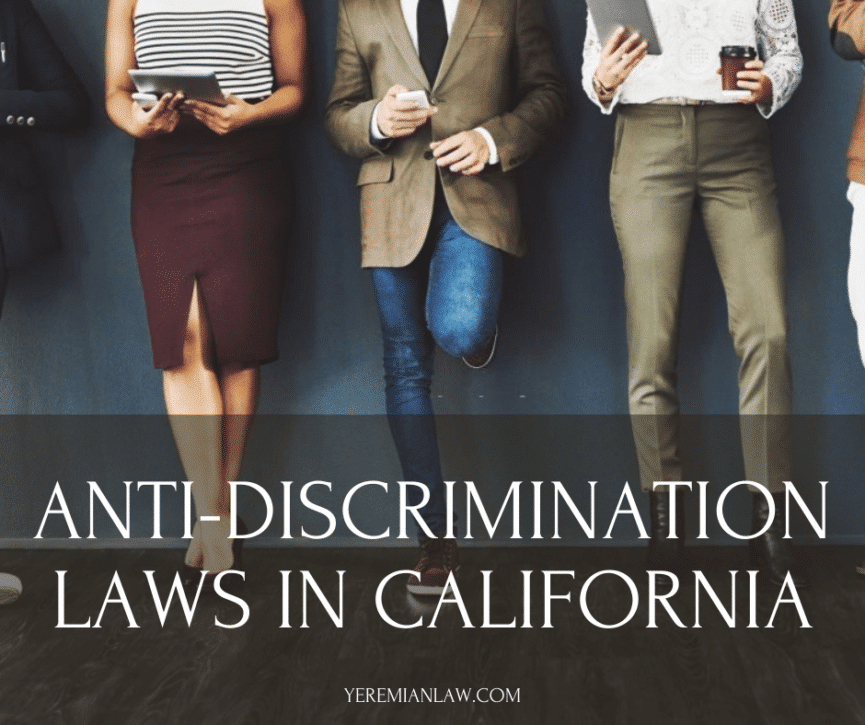Discrimination in the workplace – whether it’s related to hiring, working or terminating employees – is unlawful at the national level. However, anti-discrimination laws in California take things a step farther than federal laws do.
California’s Anti-Discrimination Laws vs. Federal Anti-Discrimination Laws
The table below illustrates California’s anti-discrimination laws versus federal anti-discrimination laws.
| Protected Class | Illegal at the Federal Level | Illegal in California |
| Race | Yes | Yes |
| Color | Yes | Yes |
| National origin | Yes | Yes |
| Religion | Yes | Yes |
| Sex (including pregnancy, childbirth and related medical conditions | Yes | Yes |
| Disability | Yes | Yes |
| Age | Yes | Yes |
| Citizenship status | Yes | Yes |
| Genetic information | Yes | Yes |
| Ancestry | No | Yes |
| Disability (physical or mental) | No | Yes |
| Marital status | No | Yes |
| Sexual orientation | No | Yes |
| Gender identity | No | Yes |
| Gender expression | No | Yes |
| AIDS or HIV status | No | Yes |
| Medical conditions | No | Yes |
| Political activities or affiliations | No | Yes |
| Military or veteran status | No | Yes |
| Status as a victim of domestic violence | No | Yes |
| Status as a victim of assault | No | Yes |
| Status as a victim of stalking | No | Yes |
Some cities have other laws that protect people, too. San Francisco, for example, prohibits discrimination based on a person’s height and weight.
Related: What is racial discrimination in the workplace?
What Employers Are Subject to Anti-Discrimination Laws?
Nearly all employers must abide by federal and state anti-discrimination laws. When it comes to federal laws, employers in California that have more than 15 employees must abide by them – except:
- Age discrimination, which applies to employers with 20 or more employees
- Citizenship status discrimination, which applies to employers with four or more employees
- Equal pay for men and women, which applies to every employer in the state of California
California’s antidiscrimination laws, which are more comprehensive than the federal set, apply to employers with five or more employees.
Related: Types of discrimination in the workplace
Who’s in Charge of Enforcement and Regulation?
The Equal Employment Opportunity Commission is a federal agency that regulates discrimination in the workplace. When it comes to state regulation, it’s under the Department of Fair Employment and Housing, or DFEH.
Common Anti-Discrimination Laws That Employers Violate
California’s anti-discrimination laws that employers commonly violate include:
- Age
- Disability
- Pregnancy
- Race or color
- Religious
- National origin
- Sex
Here’s a closer look at each.
Anti-Discrimination Laws on Age
Age is protected by anti-discrimination laws. Employers aren’t legally allowed to discriminate against a person because of his or her age, as long as the person is over the age of 40. That means they can’t use age as a deciding factor in anything that has to do with hiring or firing, benefits, pay, job assignments, promotion or training.
Anti-Discrimination Laws on Disability
Employers cannot discriminate against someone for actual or perceived disabilities. Disabilities do not have to be visible – or even physical – for the law to protect someone in California.
Anti-Discrimination Laws on Pregnancy
Companies are not allowed to treat a person unfavorably because of pregnancy, childbirth or any medical condition related to pregnancy or childbirth. The Pregnancy Discrimination Act is a measure the state has enacted to prohibit employers from using pregnancy in employment decisions.
Anti-Discrimination Laws on Race or Color
Employers are never allowed to use a person’s race or color in an employment decision. If employers know that racial discrimination is occurring in their workplaces, they are legally required to take action to stop it – and to prevent it from happening again in the future.
Anti-Discrimination Laws on Religion
No employer is allowed to use a person’s religion to make an employment decision, including hiring and firing, promotions, pay, bonuses, vacations, firing or anything else. Employers must also provide reasonable accommodations for people to take time off for religious holidays and uniforms, as well as make appropriate job reassignments.
Anti-Discrimination Laws on National Origin
Employers are not allowed to treat applicants or employees unfavorably because of where they’re from, which is known as national origin discrimination. A person’s national origin can refer to a certain country or even to a certain part of the world (such as the Middle East), or to a person’s ethnicity or the way he or she talks. Protections even extend to a person’s marriage to someone from a certain nation or place.
Anti-Discrimination Laws on Sex
No employer is permitted to discriminate on the basis of sex, gender or sexual preference when it comes to employment decisions, whether they’re interviewing applicants or deciding which people to lay off or fire.
Do You Need to Talk to an Employment Attorney About California’s Anti-Discrimination Laws?
If you feel you may have been discriminated against for any reason, whether you’re protected by California or federal law, we may be able to help you. Call us at 818-230-8380 right now for a free consultation. You’ll talk to a caring, compassionate and experienced employment lawyer who understands what you’re going through – and who knows how to help.




